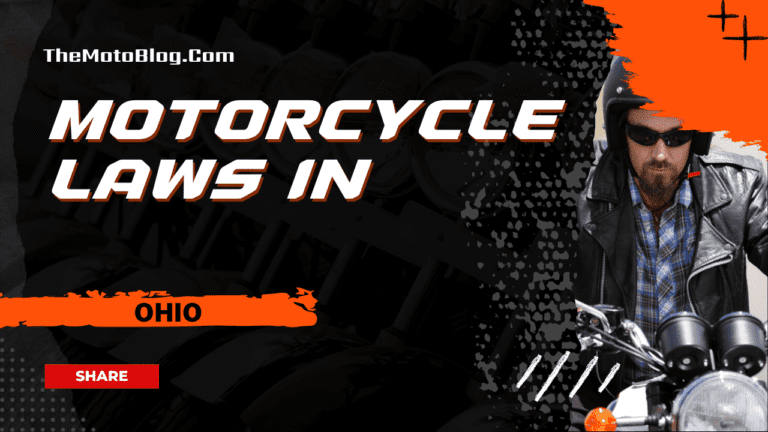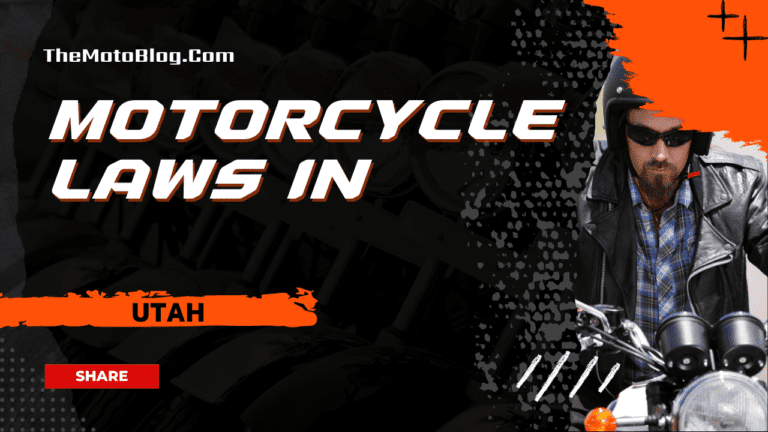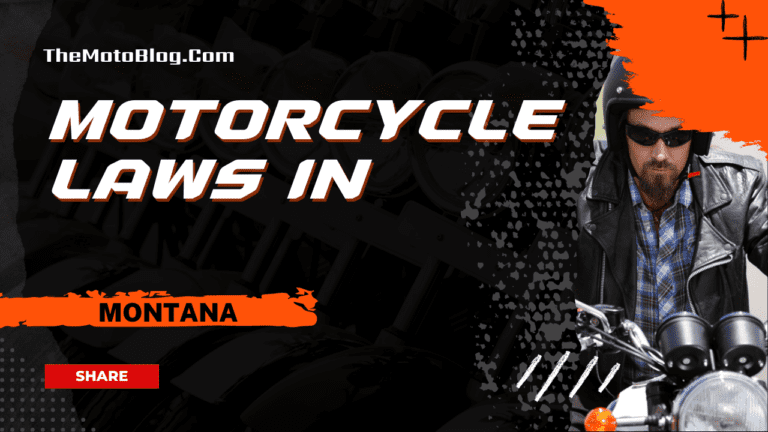Motorcycle Laws in Nebraska: Everything You Need to Know for Your Ride
Riding a motorcycle isn’t just about the open road and feeling the wind in your face. It’s also about understanding and following the specific laws of each state. In Nebraska, for instance, there are several unique rules that motorcyclists must abide by.
Helmet use is mandatory for all riders in Nebraska, regardless of age or experience level. This isn’t a suggestion, it’s law. Every time you hop on your bike, you’re required to strap on a helmet that meets federal safety standards.
Additionally, Nebraska has special requirements when it comes to eye protection. Unless your bike is equipped with a windscreen, you’ll need to wear goggles or glasses while riding. So next time you’re preparing for a ride around Omaha or Lincoln remember these rules – they’re not just guidelines but laws designed to ensure your safety on the Nebraska roads!
Key Takeaways
- In Nebraska, helmet use is mandatory for all motorcycle riders regardless of age or experience level.
- Nebraska also requires motorcyclists to use eye protection unless the bike is equipped with a windscreen.
- To carry passengers, the motorcycle must be specifically designed for this purpose with permanent handholds and separate footrests for passenger use.
- Handlebars on motorcycles in Nebraska shouldn’t be higher than shoulder level for better control while riding.
- It is illegal to perform lane splitting under Nebraska law, i.e., riding between lanes of traffic moving in the same direction.
- To get a motorcycle license in Nebraska, riders must have a valid driver’s license, completion of a state-approved safety course, and passing scores on written and on-cycle tests.
- Under new Nebraska law, individuals aged 21 and over with at least two years of riding experience or have completed a safety course can ride without a helmet.
- Motorcyclists with a DUI conviction face severe penalties including hefty fines, license suspension, and even jail time.
- During a traffic stop, Nebraska motorcyclists are advised to handle the situation calmly and cooperatively, providing the necessary documents and avoiding sudden movements or arguments with the officer.
Motorcycle laws in Nebraska are geared toward ensuring safety on the roads, with regulations including mandatory helmet usage for all riders, eye protection, and restrictions on carrying passengers until a designated experience level is reached. However, when venturing into neighboring states, bikers will notice slight variations in regulations. For example, in Iowa, helmets are not required for those over 18, and South Dakota has a similar approach, along with no restrictions on handlebar heights. In contrast, Kansas implements helmet laws for those under 18 and also has specific regulations regarding passenger age. Missouri mandates helmet usage for all riders, similar to Nebraska, but with differing equipment laws. These neighboring states each have unique motorcycle laws that emphasize safety, but with distinct requirements. Riders planning to travel across state lines should be aware of these variations to ensure a lawful and enjoyable riding experience.
Understanding Nebraska’s Motorcycle Laws
I’ve dug into the specifics of motorcycle laws in Nebraska, and there’s quite a bit to unpack. First off, helmets are mandatory for all riders, without exception. It doesn’t matter if you’re 16 or 60 – safety first is the mantra here.
Nebraska also enforces strict laws on eye protection. If your bike doesn’t have a windscreen, you’ll have to don some form of protective eyewear. Think goggles or glasses made from safety glass or plastic.
Interested in carrying passengers? You should be aware that Nebraska allows this only if your motorcycle is specifically designed to do so. You can’t just throw an extra seat on any bike and call it good.
When talking about handlebars, keep in mind that they shouldn’t be higher than shoulder level. This rule isn’t just for show – it’s actually meant to provide better control while riding.
Check out these key points:
- Helmets: Mandatory for all riders
- Eye Protection: Required unless equipped with windscreen
- Passenger Rules: Allowed only on designated seats
- Handlebar Height: Not above shoulder height
As far as equipment goes, mirrors are a must-have on both sides of the bike. Turn signals aren’t explicitly required by law but having them could help prevent accidents.
Now let’s touch upon lane splitting – riding between lanes of traffic moving in the same direction. In many places, this practice is illegal and guess what? That includes Nebraska too!
Lastly, I want to mention insurance requirements because we know how crucial they are right? Well in Nebraska, bikers must carry liability insurance with minimum coverage amounts set by law.
The Importance of Motorcycle Licensing in Nebraska
First off, let’s look at the numbers. According to the National Highway Traffic Safety Administration (NHTSA), unlicensed riders are involved in more fatal accidents than their licensed counterparts. Here’s a quick breakdown:
| Licensed Riders | Unlicensed Riders |
|---|---|
| 20% | 30% |
It seems obvious, right? Yet there are still those who choose to ride without proper licensing.
Beyond the chilling statistics, motorcycle licensing plays another vital role—it ensures that motorcyclists have received adequate training and possess the necessary skills to operate their vehicles safely on public roads. In Nebraska, obtaining your license involves passing both written and practical exams which evaluate your knowledge of traffic laws and motorcycle operation techniques.
Also worth mentioning is the fact that riding without a valid license can result in hefty penalties such as fines or even incarceration. It’s also important to note that if you’re involved in an accident while unlicensed, insurance companies may refuse coverage—leaving you with potentially enormous out-of-pocket expenses.
So here’s my advice: don’t play roulette with your life or finances! If you’re considering hitting Nebraska roads on two wheels—and I’m all for it—make sure you’ve got your bases covered by securing proper licensure first.
Here’s what you need:
- A valid driver’s license
- Completion of a state-approved safety course
- Passing scores on written and on-cycle tests
Helmet Requirements: A Vital Part of Nebraska’s Motorcycle Laws
If you’re a biker in Nebraska, it’s essential to know the helmet laws. Nebraska is one of the 19 states that implements a universal helmet law. This means that all motorcycle riders, regardless of age or experience, are required by law to wear a helmet.
Now let’s get into specifics. The type of helmet matters too – it can’t just be any old hat. It has to meet federal safety standards set by the Department of Transportation (DOT). You’ll see a DOT sticker on helmets that comply with these stringent regulations.
Not wearing an approved helmet while riding isn’t just unsafe, it’s also illegal and could land you in hot water. Penalties for non-compliance range from fines to even potential jail time:
| Offense | Penalty |
|---|---|
| First offense | $100 fine |
| Second offense | $200 fine |
| Third and subsequent offenses | Up to $500 fine or up to 1 year imprisonment |
While some might argue against mandatory helmet laws citing personal freedom, I’d like stress on this fact – helmets save lives. Various studies have shown that wearing a motorcycle helmet can reduce the risk of head injury by 69% and reduce the risk of death by almost 37%. So yes, they’re more than just an accessory.
Apart from helmets, there are other protective gear requirements too:
- Eye protection: Unless your bike comes equipped with a windscreen
- Footwear: Protective footwear is recommended but not required
What You Should Know About Lane Splitting Laws in Nebraska
Lane splitting refers to the act of a motorcyclist riding between lanes of stopped or slow-moving traffic. Now if you’re wondering whether lane splitting is legal in Nebraska – well, I’m here to tell you that the answer is no.
Nebraska law specifically prohibits all motorcyclists from lane splitting. As per Section 60-6,309 of the Nebraska Revised Statutes: “No person shall operate a motorcycle between lanes of traffic or between adjacent lines or rows of vehicles.” The rules are clear and leave no room for interpretation.
Here are some more key points about Nebraska motorcycle laws:
- Helmets are required for all riders.
- Motorcycles must have at least one mirror on either side.
- Daytime use of headlights is mandatory.
- There’s no age restriction for passengers.
The National Highway Traffic Safety Administration (NHTSA) reports that motorcyclists were 29 times more likely than passenger car occupants to die in crashes per vehicle mile travelled in 2017. With such sobering statistics, it’s crucial we adhere strictly to the laws laid out by our state.
While I acknowledge that lane splitting might save time during peak hours or allow bikers to escape high temperatures on congested roads, it also significantly increases collision risk due its unpredictability for other drivers on the road.
DUI and Motorcycle Operation in Nebraska: An Overview
In the state of Nebraska, it’s absolutely illegal to operate any vehicle while under the influence of drugs or alcohol – motorcycles included. The legal limit for blood alcohol concentration (BAC) is 0.08%, but if you’re under 21 years old, that drops down significantly to just 0.02%.
Here are some other important points to remember:
- If you’re caught riding with a BAC at or above these limits, expect heavy penalties.
- First-time offenders could face up to $500 fine and/or imprisonment for not more than six months.
- Repeat offences see progressively harsher penalties.
| Offense Number | Maximum Fine | Jail Time |
|---|---|---|
| First | $500 | 6 months |
| Second | $1000 | 1 year |
| Third + | $10,000 | 3 years |
An additional penalty that comes into play after your second offense is mandatory ignition interlock installation – a breathalyzer attached directly to your bike’s ignition system!
If you’ve been drinking and choose to ride anyway, take note that Nebraska enforces “implied consent.” That means by using public roads in the state, riders implicitly agree to submit chemical tests when asked by law enforcement officers.
Of course, all these laws aim at one thing: safety. Motorcycles already put riders in a vulnerable position compared to car drivers; adding alcohol into the mix only multiplies those risks exponentially.
Penalties for Violating Motorcycle Laws in Nebraska
First off, let’s tackle helmet violations. Shrouded in controversy and often debated, helmet laws are nevertheless stringent in Nebraska. If caught without one while riding, you’re staring at a $100 fine on your first offense. Here’s how it stacks up:
| Offense | Fine |
|---|---|
| First | $100 |
| Second | $200 |
| Third | $300 |
Next up is disregarding lane splitting laws. Lane splitting isn’t permitted under Nebraskan law and if caught doing so, violators can incur fines ranging from $100 to $300 depending on the number of offenses.
Another critical point is about DUI (Driving Under Influence) convictions which carry severe penalties including hefty fines, license suspension, and even imprisonment. For instance:
- First DUI offense: Minimum of seven days jail time
- Second DUI offense: Minimum of 30 days jail time
- Third DUI offense: Minimum of 90 days jail time
Finally, I’ll touch upon speeding tickets which are common yet costly mistakes made by riders. In Nebraska, speeding fines can go as high as $300 depending on how much over the speed limit you were driving.
How to Handle a Traffic Stop as a Motorcyclist in Nebraska
Firstly, safety is paramount. Once you see those flashing lights, look for a safe place to pull over right away. It should be well-lit and off the main traffic flow, like a parking lot or wide shoulder on the highway. Be sure to signal your intentions to the officer by using your turn signals.
Once stopped, keep both hands conspicuously on the handlebars unless directed otherwise by the officer. Don’t make sudden moves or reach into your pockets without informing them first – this could be perceived as threatening.
Be polite and cooperative during your interaction with law enforcement. They’ll likely ask for three things: driver’s license, registration, and proof of insurance. Have these items readily available in an easy-to-access location on your bike.
In Nebraska, helmets are mandatory for all riders and passengers under age 18 according to state statute 60-6,279 (see table below):
| Age | Helmet Requirement |
|---|---|
| Under 18 | Yes |
| 18 and Over | No |
Failure to comply with this helmet law could result in being cited during a traffic stop.
Remember that just because you’ve been pulled over doesn’t necessarily mean you’ll get ticketed. If issued one though, consider consulting legal advice before paying any fines or admitting guilt – especially if you believe it was unjustified.
Here are some quick do’s and dont’s when dealing with a traffic stop:
- Do:
- Pull over safely
- Keep hands visible
- Provide necessary documents
- Don’t:
- Make sudden movements
- Argue with the officer
Recent Changes to Motorcycle Laws in Nebraska
First off, Nebraska revised its helmet law. Previously, all riders and passengers were required to wear helmets. However, the new regulation allows individuals aged 21 and over with at least two years of riding experience or who have completed a safety course to go helmetless. It’s an alteration that many riders welcome, but it does come with increased risk.
A significant change is also seen in the area of eye protection. Now, it’s mandatory for all motorcyclists and their passengers to use eye-protection devices unless they are riding inside an enclosed cab. These devices could be glasses, goggles or windshields that meet the standards outlined by the Department of Motor Vehicles (DMV).
Furthermore, there’s been a shift in license endorsement requirements as well:
- Riders under 18 need proof of successful completion of a DMV-approved motorcycle safety course.
- Riders 18 years old and above can choose between passing a written test and skills test OR completing the safety course.
Lastly, let me touch on one more crucial update: passenger regulations. Before these changes, there weren’t any specific rules regarding passengers on motorcycles. But now, Nebraska law states that motorcyclists cannot carry passengers unless their bike is designed to do so – meaning it must have permanent handholds and separate footrests for passenger use.
These changes may seem minor individually but together they represent considerable evolution in Nebraska’s approach towards motorcycle legislation aimed at enhancing rider safety while still allowing personal freedom on the roadways.
Conclusion: Staying Safe and Legal on Your Bike
I’ve spent the last sections detailing Nebraska’s motorcycle laws, so let’s wrap things up. The goal here isn’t just to avoid legal trouble—it’s about staying safe on the open road as well.
Motorcycle safety is no joke. I can’t stress enough how important it is to follow these rules. Always remember:
- Wear a helmet, even if you’re over 21.
- Keep your lights on at all times.
- Don’t ride under the influence of alcohol or drugs.
Every year, countless accidents are preventable with these simple steps.
Nebraska’s laws aren’t arbitrary—they’re designed to protect you and others sharing the road. Disregarding them doesn’t just put you in legal jeopardy; it puts lives at risk too.
Having said that, knowing the law is one thing—practicing it is another. It’s easy to forget a rule or two while you’re out there enjoying Nebraska’s scenic routes.
That’s why I recommend making a pre-ride checklist (like pilots do before takeoff). A quick run through this list can save you from potential problems down the line:
- Check your helmet
- Test your lights
- Review speed limits
Sticking to these rules won’t just keep you safe—it’ll make riding more enjoyable too. So there we have it—a comprehensive guide to Nebraska’s motorcycle laws and some tips for staying safe while enjoying your ride.
By adhering strictly to these regulations and guidelines, not only will we remain on the right side of Nebraska law but also ensure our rides are as safe as possible!
Motorcycle Laws in the US By States
If you liked this article, then please subscribe to our YouTube Channel for more Bike Videos. You can also find us on Instagram, Twitter and Facebook.
Disclosure: As an Amazon Associate, I earn from qualifying purchases. Read more about Amazon Affiliate Disclaimer.

Vishwanath Mathpati
I am Vishwanath Mathpati, a full-time Blogger and Motorcyclist from Bidar, Karnataka. I love writing about my Motorcycles Stories and Riding Gears on this blog.
Know More About Me.






